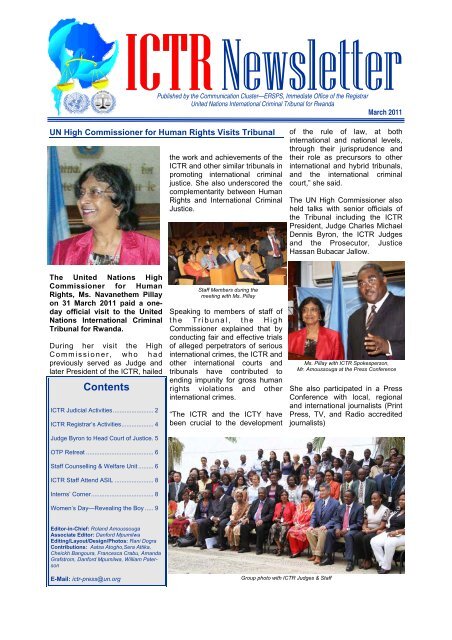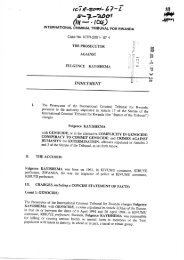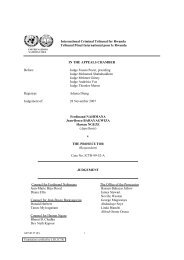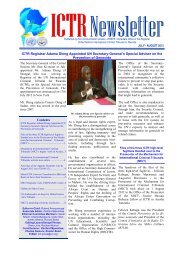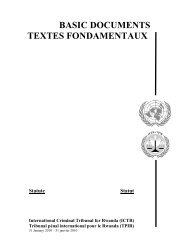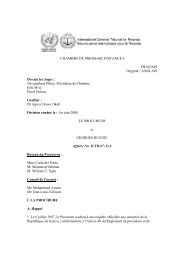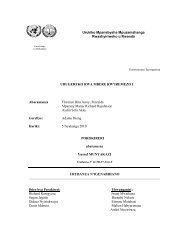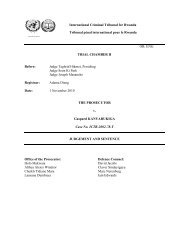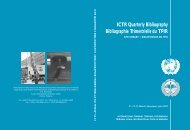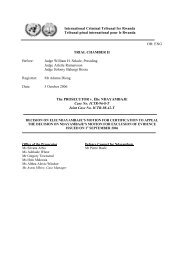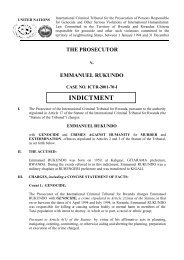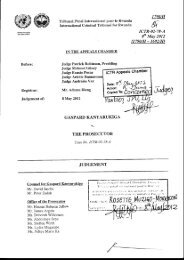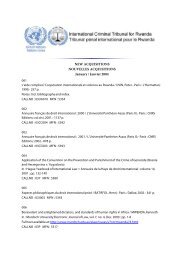Contents - International Criminal Tribunal for Rwanda
Contents - International Criminal Tribunal for Rwanda
Contents - International Criminal Tribunal for Rwanda
You also want an ePaper? Increase the reach of your titles
YUMPU automatically turns print PDFs into web optimized ePapers that Google loves.
ICTR<br />
ICTR Newsletter<br />
Published by the Communication Cluster—ERSPS, Immediate Office of the Registrar<br />
United Nations <strong>International</strong> <strong>Criminal</strong> <strong>Tribunal</strong> <strong>for</strong> <strong>Rwanda</strong><br />
March 2011<br />
UN High Commissioner <strong>for</strong> Human Rights Visits <strong>Tribunal</strong><br />
the work and achievements of the<br />
ICTR and other similar tribunals in<br />
promoting international criminal<br />
justice. She also underscored the<br />
complementarity between Human<br />
Rights and <strong>International</strong> <strong>Criminal</strong><br />
Justice.<br />
of the rule of law, at both<br />
international and national levels,<br />
through their jurisprudence and<br />
their role as precursors to other<br />
international and hybrid tribunals,<br />
and the international criminal<br />
court,” she said.<br />
The UN High Commissioner also<br />
held talks with senior officials of<br />
the <strong>Tribunal</strong> including the ICTR<br />
President, Judge Charles Michael<br />
Dennis Byron, the ICTR Judges<br />
and the Prosecutor, Justice<br />
Hassan Bubacar Jallow.<br />
The United Nations High<br />
Commissioner <strong>for</strong> Human<br />
Rights, Ms. Navanethem Pillay<br />
on 31 March 2011 paid a oneday<br />
official visit to the United<br />
Nations <strong>International</strong> <strong>Criminal</strong><br />
<strong>Tribunal</strong> <strong>for</strong> <strong>Rwanda</strong>.<br />
During her visit the High<br />
Commissioner, who had<br />
previously served as Judge and<br />
later President of the ICTR, hailed<br />
<strong>Contents</strong><br />
ICTR Judicial Activities ........................ 2<br />
ICTR Registrar’s Activities ................... 4<br />
Judge Byron to Head Court of Justice . 5<br />
OTP Retreat ........................................ 6<br />
Staff Counselling & Welfare Unit ......... 6<br />
ICTR Staff Attend ASIL ....................... 8<br />
Interns’ Corner ..................................... 8<br />
Women’s Day—Revealing the Boy ..... 9<br />
Staff Members during the<br />
meeting with Ms. Pillay<br />
Speaking to members of staff of<br />
the <strong>Tribunal</strong>, the High<br />
Commissioner explained that by<br />
conducting fair and effective trials<br />
of alleged perpetrators of serious<br />
international crimes, the ICTR and<br />
other international courts and<br />
tribunals have contributed to<br />
ending impunity <strong>for</strong> gross human<br />
rights violations and other<br />
international crimes.<br />
“The ICTR and the ICTY have<br />
been crucial to the development<br />
Ms. Pillay with ICTR Spokesperson,<br />
Mr. Amoussouga at the Press Conference<br />
She also participated in a Press<br />
Conference with local, regional<br />
and international journalists (Print<br />
Press, TV, and Radio accredited<br />
journalists)<br />
Editor-in-Chief: Roland Amoussouga<br />
Associate Editor: Dan<strong>for</strong>d Mpumilwa<br />
Editing/Layout/Design/Photos: Rani Dogra<br />
Contributions: Aatsa Atogho,Sera Attika,<br />
Cheickh Bangoura, Francesca Crabu, Amanda<br />
Grafstrom, Dan<strong>for</strong>d Mpumilwa, William Paterson<br />
E-Mail: ictr-press@un.org<br />
Group photo with ICTR Judges & Staff
ICTR Newsletter<br />
March 2011<br />
ICTR Judicial Activities<br />
• Work of the Trial Chambers and the Appeals<br />
Chamber in March 2011<br />
Trial Chamber I<br />
The work of this Trial Chamber has been completed.<br />
Trial Chamber II<br />
Ongoing Trials<br />
Ngirabatware<br />
The Defence filed an Amended Pre-Defence Brief on 4<br />
March 2011. On 9 March 2011, the Chamber denied a<br />
Prosecution Motion to compel a reduction in the<br />
Defence witness list and to order the disclosure of<br />
additional witness statements, and dismissed as moot<br />
the Prosecution request concerning the Defence order<br />
of appearance. On 15 March 2011, the Chamber<br />
requested that the Arab Republic of Egypt assist in<br />
facilitating a meeting between the Defence and an<br />
Egyptian national. On 30 March 2011, the Chamber<br />
requested the assistance of France in providing<br />
immigration and other records of six listed Defence<br />
witnesses, and directed the Prosecution to disclose<br />
these records once obtained. During the reporting<br />
period the Chamber issued three written Decisions and<br />
one Scheduling Order.<br />
Trials in Judgement Drafting Phase<br />
Nyiramasuhuko et al. (“Butare”)<br />
Deliberations and judgement drafting continued.<br />
Nidiliyimana et al. (“Military II”)<br />
Deliberations and judgement drafting continued.<br />
Bizimungu et al.<br />
Deliberations and judgement drafting continued.<br />
Trial Chamber III<br />
Ongoing trials<br />
Nzabonimana<br />
The Trial Chamber heard seven witnesses during the<br />
month of March 2011. It issued ten decisions during<br />
the same period.<br />
Karemera et al.<br />
The Parties are now working on their Closing Briefs,<br />
and the Chamber issued seven decisions during the<br />
month of March.<br />
Ndahimana<br />
The Trial Chamber issued one decision in March 2011.<br />
Trial in Judgement Drafting Phase<br />
Gatete<br />
On 29 March 2011, Trial Chamber III sentenced Jean-<br />
Baptiste Gatete (<strong>for</strong>mer director in the <strong>Rwanda</strong>n<br />
Ministry of Women and Family Affairs) to a life<br />
sentence. He was found guilty of genocide and<br />
extermination as a crime against humanity, but<br />
acquitted of rape as a crime against humanity.<br />
Ongoing Trials<br />
Nizeyimana:<br />
The Chamber issued six decisions in March 2011, and<br />
heard the complete testimony of 38 Prosecution<br />
witnesses. The Prosecution rested its case on 25<br />
February 2011.<br />
Pre-Trial<br />
Uwinkindi<br />
Preliminary analysis of submissions has been<br />
undertaken in March 2011.<br />
Kayishema<br />
The Chamber previously granted the request of the<br />
<strong>International</strong> <strong>Criminal</strong> Defence Attorneys Association<br />
<strong>for</strong> leave to appear as an amicus curiae and invited the<br />
Republic of <strong>Rwanda</strong> to file submissions in relation to<br />
the Prosecution's request to transfer the case of<br />
Fulgence Kayishema to the jurisdictions of <strong>Rwanda</strong>.<br />
Sikubwabo<br />
The Chamber previously granted the request of the<br />
<strong>International</strong> <strong>Criminal</strong> Defence Attorneys Association<br />
<strong>for</strong> leave to appear as amicus curiae and invited the<br />
Republic of <strong>Rwanda</strong> to file submissions in relation to<br />
the Prosecution's request to transfer the case of<br />
Charles Sikubwabo to the jurisdictions of <strong>Rwanda</strong>.<br />
71 bis Applications<br />
Kabuga<br />
In the Kabuga case, the Prosecution filed a motion <strong>for</strong><br />
the taking of depositions pursuant to Rule 71 bis of the<br />
Rules of Procedure and Evidence. The President<br />
appointed a Trial Chamber in order to rule on this<br />
Motion. A Duty Counsel has been appointed to<br />
represent the interests of the Accused at large.<br />
Bizimana<br />
In the Bizimana case, the Prosecution filed a motion<br />
<strong>for</strong> the taking of depositions pursuant to Rule 71 bis of<br />
the Rules of Procedure and Evidence. The President<br />
appointed a Trial Chamber in order to rule on this<br />
Motion. A Duty Counsel has been appointed to<br />
represent the interests of the Accused at large<br />
Mpiranya<br />
In the Mpiranya case, the Prosecution filed a motion<br />
<strong>for</strong> the taking of depositions pursuant to Rule 71 bis of<br />
the Rules of Procedure and Evidence. The President<br />
appointed a Trial Chamber in order to rule on this<br />
Motion. A Duty Counsel has been appointed to<br />
represent the interests of the Accused at large<br />
Appeals Chamber<br />
In March, the Appeals Chamber heard appeals from<br />
judgement in 3 cases (Bagosora & Nsengiyumva,<br />
Setako, Munyakazi) and issued 2 decisions on<br />
interlocutory appeals in Nizeyimana and Karemera &<br />
Ngirumpatse cases as well as 20 pre-appeal decisions<br />
or orders.<br />
-2-
ICTR Newsletter<br />
March 2011<br />
Currently, the Appeals Chamber is seized of 14<br />
matters, including 8 cases involving appeals from<br />
judgement.<br />
In the Renzaho case the Trial Judgement was<br />
rendered on 14 July 2009, the briefing in this appeal<br />
concluded on 5 May 2010, and the appeal was heard<br />
on 16 June 2010. The Appeal Judgement will be<br />
delivered on 1 April 2011.<br />
The Trial Judgement in the Muvunyi case was<br />
rendered on 11 February 2010. The briefing of the<br />
appeals was completed at the end of July 2010, and<br />
the appeals were heard on 21 October 2010. The<br />
Appeal Judgement will be delivered on 1 April 2011.<br />
The Bagosora et al. Trial Judgement was pronounced<br />
on 18 December 2008 and issued in writing on 9<br />
February 2009. Theoneste Bagosora, Aloys<br />
Ntabakuze, and Anatole Nsengiyumva appealed. The<br />
briefing in respect of the appeals was completed at the<br />
end of July 2010. The appeals of Theoneste Bagosora<br />
and Anatole Nsengiyumva were heard from 30 March<br />
2011 through 1 April 2011. Due to unavailability of<br />
Aloys Ntabakuze’s counsel <strong>for</strong> the scheduled hearing<br />
of his appeal, the Appeals Chamber severed his case<br />
and decided to hear his appeal later.<br />
The Trial Judgement in the Setako case was rendered<br />
on 25 February 2010 and issued in writing on 1 March<br />
2010. Both parties filed notices of appeal and the<br />
briefing was completed in November 2010. The<br />
appeals were heard on 29 March 2011.<br />
The Trial Judgement in the Munyakazi case was<br />
rendered on 30 June 2010 and issued in writing on 5<br />
July 2010. Both parties filed notices of appeal in<br />
August 2010 and the briefing was completed in<br />
January 2011. The appeals were heard on 28 March<br />
2011.<br />
The Trial Judgement in the Ntawukulilyayo case was<br />
rendered on 3 August 2010 and issued in writing on 6<br />
August 2010. Dominique Ntawukulilyayo filed his<br />
notice of appeal on 6 September 2010 and the briefing<br />
was completed in March 2011. The appeal is presently<br />
being prepared <strong>for</strong> a hearing.<br />
The Trial Judgement in the Kanyarukiga case was<br />
rendered on 1 November 2010 and issued in writing on<br />
9 November 2010. Both parties filed notices of appeal<br />
in December 2010 and the briefing is in progress.<br />
The Trial Judgement in the Hategekimana case was<br />
rendered on 6 December 2010 and issued in writing on<br />
14 February 2011. Ildephonse Hategekimana filed his<br />
notice of appeal on 16 March 2011 and the briefing is<br />
in progress.<br />
In addition to these appeals, the Appeals Chamber is<br />
seized of 2 interlocutory appeals in the Ngirabatware<br />
and Nzabonimana cases, 2 requests <strong>for</strong> review in the<br />
Kamuhanda and Ndindabahizi cases, as well as 2<br />
other requests in the Niyitegeka and Nshogoza<br />
cases.<br />
During 2011, the Appeals Chamber delivered 2<br />
decisions on interlocutory appeals, 2 decisions on<br />
review or other post-appeal requests, and issued 47<br />
pre-appeal orders or decisions. To date, the Appeals<br />
Chamber has delivered 27 Judgements, concluding<br />
the appellate proceedings in respect of 33 persons.<br />
• Appeals Chamber Hears Arguments in Setako<br />
Case<br />
The Appeals Chamber of the<br />
<strong>International</strong> <strong>Criminal</strong> <strong>Tribunal</strong><br />
<strong>for</strong> <strong>Rwanda</strong>, composed of<br />
Judge Patrick Robinson,<br />
presiding, Judge Mehmet<br />
Güney, Judge Fausto Pocar,<br />
Judge Liu Daqun, and Judge<br />
Carmel Agius, on 29 March<br />
2011, heard oral arguments<br />
regarding the appeals by<br />
Ephrem Setako and the Prosecution against the<br />
Judgement rendered by Trial Chamber I on 25<br />
February 2010 and issued in writing on 1 March 2010.<br />
The Trial Chamber convicted Setako of genocide <strong>for</strong><br />
ordering the killings of Tutsis at Mukamira military<br />
camp, Ruhengeri prefecture, on 25 April and 11 May<br />
1994. Moreover, in relation to the killings on 25 April<br />
1994, it convicted Setako of extermination as a crime<br />
against humanity and murder as a serious violation of<br />
Article 3 common to the Geneva Conventions and<br />
Additional Protocol II. Setako was sentenced to a<br />
single term of 25 years of imprisonment.<br />
Setako challenged his convictions and requested the<br />
Appeals Chamber to overturn them, quash his<br />
sentence, and release him. In the alternative, he<br />
requested the Appeals Chamber to order a retrial and<br />
his release on bail. Setako claimed that the Trial<br />
Chamber made numerous errors of fact and law.<br />
The Prosecution raised three grounds of appeal and<br />
requested the Appeals Chamber to correct the errors<br />
and increase the sentence to life imprisonment.<br />
At the time of the relevant events, Setako served as<br />
head of the legal affairs division of the Ministry of<br />
Defence. The accused was arrested on 25 February<br />
2004 in The Netherlands and transferred to the United<br />
Nations Detention Facility on 17 November 2004. His<br />
trial opened on 25 August 2008 and closed on 26 June<br />
2009, after 60 trial days.<br />
• Jean-Baptiste Gatete Sentenced to Life<br />
Imprisonment<br />
Trial Chamber III of the United<br />
Nations <strong>International</strong> <strong>Criminal</strong><br />
<strong>Tribunal</strong> <strong>for</strong> <strong>Rwanda</strong>on 29<br />
March 2011 sentenced Jean-<br />
Baptiste Gatete, <strong>for</strong>mer Mayor<br />
of Murambi Commune in<br />
Byumba prefecture and, in April<br />
1994, Director in the <strong>Rwanda</strong>n<br />
Ministry of Women and Family<br />
Affairs, to life imprisonment.<br />
The Trial Chamber composed of Judges Khalida Khan<br />
-3-
ICTR Newsletter<br />
March 2011<br />
(Pakistan), presiding, Lee Gacuiga Muthoga (Kenya)<br />
and Aydin Akay (Turkey) found Gatete guilty of<br />
genocide and extermination as a crime against<br />
humanity. The accused had been charged with six<br />
counts: genocide, or, in the alternative, complicity in<br />
genocide, conspiracy to commit genocide, and the<br />
crimes against humanity of extermination, murder and<br />
rape.<br />
The Chamber found that, pursuant to Gatete’s orders,<br />
Interahamwe killed Tutsi civilians in Rwankuba sector.<br />
Moreover, soldiers, policemen and Hutu civilians who<br />
participated in the killings were also recruited on<br />
Gatete’s instructions. It also concluded that Gatete<br />
issued express orders to kill Tutsi refugees in a<br />
coordinated attack at Kiziguro parish, resulting in the<br />
killings of hundreds, if not thousands, of Tutsi civilians<br />
by soldiers, Interahamwe and civilian militia.<br />
Further, the Trial Chamber found that at Mukarange<br />
parish, Gatete participated in a second coordinated<br />
attack where hundreds, if not thousands, of Tutsi<br />
civilians were killed. He also delivered weapons that<br />
were ultimately a decisive factor in the success of the<br />
assault.<br />
The accused was arrested on 11 September 2002 in<br />
the Democratic Republic of the Congo. On 20<br />
September 2002, during his initial appearance, he<br />
pleaded not guilty to the previous ten counts contained<br />
in the first indictment. His trial began on 20 October<br />
2009 and closed on 29 March 2010. The Prosecution<br />
called 22 witnesses, while the Defence presented 27.<br />
Closing Arguments were heard on 8 November 2010.<br />
The Prosecution team was led by Senior Trial<br />
Attorneys Richard Karegyesa (Uganda), and Drew<br />
White (Canada) and included Adelaide Whest, Didace<br />
Nyirinkwaya and Yasmine Chubin. Gatete was<br />
represented by Maître Marie-Pierre Poulain (France)<br />
and Kate Gibson (Australia).<br />
• Appeals Chamber Hears Oral Arguments in the<br />
Munyakazi Case<br />
The Appeals Chamber of the<br />
<strong>International</strong> <strong>Criminal</strong><br />
<strong>Tribunal</strong> <strong>for</strong> <strong>Rwanda</strong>,<br />
composed of Judge Patrick<br />
Robinson, presiding, Judge<br />
Mehmet Güney, Judge Liu<br />
Daqun, Judge Andrésia Vaz,<br />
and Judge Carmel Agius, on<br />
29 March 2011 heard oral<br />
arguments in the appeals<br />
filed by Yussuf Munyakazi and the Prosecution against<br />
the judgement pronounced by Trial Chamber I on 30<br />
June 2010 and filed in writing on 5 July 2010.<br />
The Trial Chamber convicted Munyakazi of genocide<br />
and extermination as a crime against humanity based<br />
on his role in the killings of Tutsis at Shangi and<br />
Mibilizi parishes on 29 and 30 April 1994, respectively,<br />
and sentenced him to 25 years of imprisonment.<br />
Munyakazi contends that the Trial Chamber committed<br />
a number of errors of fact and law and requests the<br />
Appeals Chamber to overturn his conviction or, in the<br />
alternative, to reduce his sentence. The Prosecution<br />
requests that the Appeals Chamber enter a conviction<br />
<strong>for</strong> committing genocide and extermination as a crime<br />
against humanity in relation to the events at<br />
Nyamasheke parish on 16 April 1994 and <strong>for</strong><br />
participating in a joint criminal enterprise. It also<br />
requests the Appeals Chamber to increase<br />
Munyakazi’s sentence to life imprisonment.<br />
Munyakazi was born in 1936 in Rwamatamu<br />
Commune, Kibuye Prefecture, <strong>Rwanda</strong>. In 1994, he<br />
lived in Bugarama Commune, Cyangugu Prefecture<br />
where he was a landowner and farmer. He was<br />
arrested on 5 May 2004 in the Democratic Republic of<br />
Congo and was transferred to the UN Detention<br />
Facility on 7 May 2004. In his initial appearance on 12<br />
May 2004, Munyakazi pleaded not guilty to all charges.<br />
ICTR Registrar’s Activities<br />
In March 2011, the Registrar of the ICTR, Mr. Adama<br />
Dieng, undertook three missions to New York, Geneva<br />
and Paris, respectively.<br />
• New York<br />
First Resource Group Meeting on the<br />
establishment of the <strong>International</strong> <strong>Tribunal</strong>s<br />
Residual Mechanism<br />
The Registrars of ICTR and ICTY attended the first<br />
meeting of the Resource Group on the <strong>International</strong><br />
<strong>Tribunal</strong>s Residual Mechanism (RM) in New York on<br />
17 March 2011, under the auspices and coordination<br />
of the Office of Legal Affairs (OLA). This high-level<br />
meeting involved representatives of various Secretariat<br />
Departments, including Archives, Premises, Safety<br />
and Security, and Management, in particular the<br />
Controller’s Office and the Office of Human Resources<br />
Management.<br />
The <strong>Tribunal</strong>s and Headquarters Departments<br />
expressed a general understanding of and<br />
commitment to the RM activities. The Registrars<br />
seized this occasion to flag a number of issues,<br />
especially concerning budgetary and human resources<br />
aspects of the RM which required further clarification<br />
from New York to enable the <strong>Tribunal</strong>s to continue the<br />
preparation of the RM.<br />
Meeting with Ambassador Jose Felipe Moraes<br />
Cabral, Chair of the In<strong>for</strong>mal Working Group on<br />
<strong>International</strong> <strong>Tribunal</strong>s (IWIGT)<br />
Mr. Dieng and the Registrar of ICTY, Mr. John<br />
Hocking, met with the Permanent Representative of<br />
the Mission of Portugal to the United Nations,<br />
Ambassador Jose Felipe Moraes Cabral, Chair of<br />
In<strong>for</strong>mal Working Group on <strong>International</strong> <strong>Tribunal</strong>s<br />
(IWGIT) and discussed the conclusion of the <strong>Tribunal</strong>s’<br />
remaining work and the preparation of the RM.<br />
The Registrars provided a briefing on the progress of<br />
the development of the RM archives policies, the lifting<br />
of witness protection orders and the preparation of the<br />
handover of protected witness files to the RM.<br />
-4-
ICTR Newsletter<br />
March 2011<br />
Ambassador Cabral expects a great deal of<br />
cooperation by the <strong>Tribunal</strong>s <strong>for</strong> the prompt conclusion<br />
of the outstanding proceedings and urged the<br />
<strong>Tribunal</strong>s to meet their respective judicial calendars.<br />
The Ambassador also called <strong>for</strong> complete commitment<br />
to the established milestones <strong>for</strong> the successful<br />
commencement of the RM.<br />
Fundraising <strong>for</strong> the ICTR Clinic <strong>for</strong> Witnesses<br />
Living with HIV/AIDS<br />
The Registrar took the opportunity of a dinner at the<br />
Lions Club <strong>International</strong> to discuss the dire<br />
circumstances facing the ICTR Clinic <strong>for</strong> Witnesses<br />
Living with HIV/AIDS unless appropriate funding is<br />
promptly received. It is hoped that a support from the<br />
Lions Club will guarantee the continued medical and<br />
psychological support of witnesses living with HIV/<br />
AIDS <strong>for</strong> an additional period of two years.<br />
The Kigali-based Clinic provides fundamental support<br />
<strong>for</strong> ICTR confirmed and potential witnesses suffering<br />
from HIV/AIDS, many of whom have also been victims<br />
of gender-based violence. The Clinic has thus far<br />
provided HIV/AIDS counselling, testing and treatment<br />
to 865 witnesses. In the past, this project has received<br />
voluntary donations from some Member States.<br />
However, these funds have been depleted. Without an<br />
immediate injection of financial resources, the Clinic<br />
will be <strong>for</strong>ced to halt the provision of life-saving<br />
treatments and shatter the hopes of women and men<br />
dependent on this support.<br />
• Geneva<br />
The Registrar paid a<br />
courtesy call on Ms.<br />
Navi Pillay, UN High<br />
Commissioner <strong>for</strong><br />
Human Rights and<br />
<strong>for</strong>mer President of<br />
the ICTR on 21<br />
March 2011. The<br />
Registrar and the<br />
High Commissioner<br />
had a fruitful<br />
discussion about the<br />
cooperation<br />
between the<br />
regional offices of<br />
the OHCHR in Africa and ICTR and looked at ways to<br />
maximize the benefits of such cooperation. The<br />
Registrar extended an invitation to the High<br />
Commissioner to visit the ICTR in Arusha in the<br />
context of her mission to Nairobi. He also suggested<br />
that an Expert Meeting be jointly organised on the<br />
theme: “<strong>International</strong> <strong>Criminal</strong> Justice and Human<br />
Rights”.<br />
The Registrar met with Ms. Erika Feller, the Assistant<br />
High Commissioner <strong>for</strong> Protection in Geneva on 21<br />
March 2011 and wrapped up the discussions of the<br />
upcoming ICTR-UNHCR Expert Meeting on<br />
Complementarities between Refugee Law,<br />
<strong>International</strong> <strong>Criminal</strong> Law and <strong>International</strong> Human<br />
Rights Law, which will be held in Arusha from 11 to 13<br />
April 2011.<br />
• Paris<br />
In Paris, the Registrar met with Mr. Hugo Sada, Head<br />
of Peace, Democracy and Human Rights Division at<br />
the Organisation internationale de la Francophonie<br />
(OIF) on 22 March 2011. The Registrar thanked OIF<br />
<strong>for</strong> its support to the work of the ICTR and further<br />
emphasized the possibility of OIF assistance to<br />
francophone countries on international justice through<br />
training and capacity building. While in Paris, the<br />
Registrar also met with Professor. Alpha Conde,<br />
President of the Republic of Guinea. President Conde<br />
reaffirmed his commitment to build a strong and<br />
efficient Judicial System in Guinea. In this regard, he<br />
extended an invitation to the ICTR to assist them by<br />
providing technical expertise and training members of<br />
the Judiciary.<br />
Sir Dennis Byron to Head the Caribbean<br />
Court of Justice, MEDIA RELEASE No. 02:2011<br />
15 March 2011<br />
Port of Spain, Trinidad and Tobago, CCJ – At the<br />
recently concluded Heads of Government meeting<br />
in St. Georges, Grenada, the Caribbean<br />
Community Heads of Government accepted to the<br />
recommendation of the Regional and Judicial<br />
Legal Services Commission (RJLSC) that the Right<br />
Honourable Sir Charles Michael Dennis Byron be<br />
appointed as the successor to the Right<br />
Honourable Michael de la Bastide T.C., President<br />
of the Caribbean Court of Justice (CCJ), who is<br />
due to retire on August 18, 2011.<br />
Sir Dennis Byron’s present<br />
assignment is as President of the<br />
United Nations <strong>International</strong><br />
<strong>Criminal</strong> <strong>Tribunal</strong> <strong>for</strong> <strong>Rwanda</strong><br />
(ICTR). The actual date of his<br />
assumption of office at the CCJ<br />
will be announced in due course.<br />
Sir Dennis, who is a native of St.<br />
Kitts and Nevis, boasts a judicial<br />
career with a solid foundation.<br />
Born in Basseterre in 1943, Sir<br />
Dennis won the Leeward Islands<br />
Scholarship in 1960 and went on<br />
to read law at Fitzwilliam College, Cambridge<br />
University from which he graduated with an M.A. and<br />
LL.B. After 16 years of private practice in the Eastern<br />
Caribbean, he went on to serve as High Court Judge,<br />
Justice of Appeal and then Chief Justice of the Eastern<br />
Caribbean Supreme Court. While there, Sir Dennis led<br />
the Eastern Caribbean Supreme Court Judical Re<strong>for</strong>m<br />
Programme, which included the establishment of a<br />
Code of Ethics <strong>for</strong> Judges, the implementation of new<br />
Civil Procedure Rules and the establishment of a<br />
Judicial Education Institute, among other<br />
achievements. His special interest in judicial education<br />
activities has led to his appointment as President of<br />
the Commonwealth Judicial Education Institute (CJEI),<br />
a position which he has held since the year 2000.<br />
In 2000, Sir Dennis Byron was knighted by Queen<br />
Elizabeth II and he was appointed a member of Her<br />
Majesty’s Privy Council in 2004.<br />
-5-
ICTR Newsletter<br />
March 2011<br />
As the current President of the ICTR, Sir Dennis Byron<br />
is responsible <strong>for</strong> the overall management of the Court<br />
and the implementation of ICTR strategic policies,<br />
through liaison with Member States and the United<br />
Nations Security Council. While at ICTR, Mr. Justice<br />
Byron has sat on seven trial benches and served on a<br />
number of pre-trial benches.<br />
Sir Dennis Byron has written many articles and<br />
publications and also holds the first Yogis and Keddy<br />
Chair in Human Rights Law at Dalhousie University<br />
Nova Scotia, Canada.<br />
The Regional Judicial and Legal Services Commission<br />
and the Caribbean Court of Justice jointly congratulate<br />
Sir Dennis Byron on his appointment as President of<br />
the CCJ and pledge their support in making his tenure<br />
a productive and successful term of office.<br />
OTP Planning and Coordination Retreat<br />
At the light of Security Council Resolution 1966 of<br />
December 2010 that calls on the ICTR to finalize its<br />
completion strategy and establish a functioning<br />
Residual Mechanism by 1 July 2012, the Office of the<br />
Prosecutor (OTP) held a Planning and Coordination<br />
Retreat from Friday, 11 to Sunday, 13 March 2011 at<br />
the Ngorongoro Farm House. This was the 5 th in a<br />
series of such retreats organized by the OTP in recent<br />
years. Arusha (2004), Amboseli (2004) Ngurdoto<br />
(2006) and Amboseli II (2006) preceded the gathering<br />
at Ngorongoro.<br />
Participants at the retreat<br />
In the environment of the Valley of Manyara, 30<br />
participants from key relevant Units, Sections and<br />
Divisions of OTP came together and comprehensively<br />
reviewed the current OTP’s workload and strategic<br />
framework and developed an action-oriented strategy<br />
<strong>for</strong> a smooth transition to the Residual Mechanism and<br />
a full implementation of SC Resolution 1966. The last<br />
day of the retreat was marked by the presence of the<br />
Honorable Justice Vagn Joensen who addressed the<br />
meeting on behalf of the President of ICTR.<br />
In his opening statement, Justice Hassan Bubacar<br />
Jallow stressed that the Strategic Review Retreat was<br />
intended to focus on the final phase of the Completion<br />
Strategy and the transition to the Residual Mechanism.<br />
He added: ‘’ The previous retreats were all important<br />
milestones in this respect particularly in determining<br />
our workload, reviewing and revising our indictment<br />
policy and adopting new prosecutional strategies in the<br />
wake of the adoption of UN Security Council<br />
Resolution 1503(2003) on the Completion Strategy.<br />
Today with the adoption of UN Security Council<br />
Resolution 1966 of 22 December 2010 establishing the<br />
<strong>International</strong> Residual Mechanism <strong>for</strong> both the ICTR<br />
and ICTY and the decision of the Security Council to<br />
bring into operation the ICTR branch of the mechanism<br />
on 1 July 2012, the ICTR stands yet again at another<br />
important crossroads in the execution of its mandate.<br />
… we face the challenges of ensuring a timely and<br />
efficient completion of the current ICTR workload, of<br />
ensuring a smooth transition to the Residual<br />
Mechanism and of laying the ground <strong>for</strong> an efficient,<br />
effective start of the ICTR Branch of the Mechanism on<br />
1 July 2012. We need to devise and implement<br />
effective strategies to successfully manage this<br />
challenging process. That is the principal objective of<br />
this OTP Strategic Review. ’’<br />
During three days the Participants discussed issues<br />
related to ICTR specific transitions arrangements to<br />
the Residual Mechanism, financial issues, staff<br />
resources and archives security matters, conclusion of<br />
trials as well as the management of R11 bis and R71<br />
bis proceedings within the timeframe of the Completion<br />
Strategy. As a final document, the participants adopted<br />
the OTP PLANNING AND COORDINATION ACTION<br />
PLAN TOWARDS THE RESIDUAL MECHANISM<br />
(NGORONGORO ACTION PLAN).<br />
The retreat was instrumental in assuring that, as a part<br />
of the ICTR, OTP adheres to the ICTR global strategy,<br />
recommending well-conceived programs or solutions<br />
to problems, and providing in<strong>for</strong>mation and/or<br />
responding to questions.<br />
Mr. Brammertz (left) with<br />
Justice Jallow<br />
Staff Counselling & Welfare Unit<br />
It was also a<br />
brainstorming session<br />
<strong>for</strong> the OTP-ICTY/OTP-<br />
ICTR Residual<br />
M e c h a n i s m<br />
Coordination Meeting<br />
that took place in<br />
Arusha on 18 March<br />
2011 which was<br />
attended by Mr. Serge<br />
Brammertz, USG and<br />
Prosecutor <strong>for</strong> the UN-<br />
ICTY and his entourage<br />
Staff Counselling & Welfare Unit, once again jointly<br />
with the Welfare Committee celebrated the Centenary<br />
of <strong>International</strong> Women’s Day.<br />
A “Hall of Fame” featuring photos of women working at<br />
the ICTR in different capacities, ranging from the<br />
cleaners to the judges, paintings, carvings and statues<br />
celebrating the achievements of women in their<br />
different roles was created in the lobby of the main<br />
entrance to honour all women working at the ICTR.<br />
The two-day celebrations held on 8 and 12 March<br />
respectively, celebrated the achievements of women<br />
from all walks of life, cultures and backgrounds under<br />
the theme: “Equal Access to Education, Training,<br />
-6-
ICTR Newsletter<br />
March 2011<br />
Science and Technology: Pathway to Decent Work <strong>for</strong><br />
Women”.<br />
The main event was a <strong>for</strong>mal<br />
dinner held at Mount Meru Hotel<br />
on 8 March, attended by the<br />
<strong>Tribunal</strong>’s Principals, ICTR staff<br />
and members of the East African<br />
Community (EAC). The<br />
Prosecutor opened the evening<br />
with a few remarks and the<br />
Registrar delivered the Secretary<br />
-General’s Message <strong>for</strong><br />
<strong>International</strong> Women’s Day. A Justice Jallow<br />
debate on the theme<br />
“<strong>International</strong> Women’s Day<br />
Celebration is a farce and has<br />
done little to advance the<br />
cause” thrilled the audience as<br />
debaters <strong>for</strong> the motion, Roland<br />
Adjovi (Arcadia University) and<br />
Inge Onsea (ICTR) battled it<br />
out with Veronica Wright (ICTR)<br />
and Anthony Kafumbe (EAC)<br />
who spoke against the motion.<br />
Mr. Dieng<br />
The moderator was Mr.<br />
Bongani Majola, ICTR Deputy Prosecutor.<br />
The winning students<br />
wrote on the essay topic<br />
“My Heroine” were Fatema<br />
Dossajee from Sinoni<br />
Secondary School who won the first prize of a 100,000<br />
TSH voucher redeemable at Book Point; Belinda<br />
Mwittah from Kaloleni Secondary School and Emiliana<br />
Focas received second and third prizes of 80,000 TSH<br />
and 60,000 TSH vouchers respectively. In addition to<br />
the vouchers from Book Point all winners received<br />
vouchers from the newly opened Fashion Institute of<br />
Drafting and Design (FIDD) in Arusha, to participate in<br />
a Fashion Design Workshop on 2 April 2011.<br />
On Saturday 12<br />
March 2011, the<br />
ICTR staff and their<br />
families flooded the<br />
The two teams: ICTR<br />
Gazelles & Arusha Spouses’<br />
Association<br />
(l-r) Inge Onsea, Roland Adjovi, Bongani Majola,<br />
Anthony Kafumbe & Veronica Wright<br />
Poems by Ayodeji Fadugba and Yann Nene-Bi, a skit<br />
by Monica Odede, Kibwana Hamadi and Beatrice<br />
Akatch together with an awesome per<strong>for</strong>mance of the<br />
sounds of the very famous Bob Marley by Judge and<br />
Mrs. Byron made the evening a memorable one. And<br />
this was not all; awards were presented to students<br />
from secondary schools in Arusha who had<br />
participated and excelled in the Essay Competition<br />
organized by the IWD Committee. The winners, who<br />
General Tyre grounds to watch the ICTR women’s<br />
football team take on the Arusha Spouses Association<br />
women’s team. The riveting game ended with a<br />
penalty kick session and the Arusha Spouses<br />
Association team won 4 to 3, taking the coveted<br />
trophy. Afterwards, a basketball game was played <strong>for</strong><br />
the first time ever at an ICTR event. Two teams that<br />
included both male and female players faced off on the<br />
court and the score was very close. Team “A” won 33<br />
to 28. What an exciting day that was!<br />
Staff Counselling & Welfare Unit would like to thank all<br />
staff members and the Welfare Committee <strong>for</strong> their<br />
support in making the programmes, events and<br />
activities a success as well as the ICTR leadership <strong>for</strong><br />
their contributions and participation in the celebrations.<br />
Thank you <strong>for</strong> celebrating with us!<br />
• ICTR Fitness Center<br />
The new Aerobic floor<br />
and the second ladies<br />
shower has been built<br />
and handed over few<br />
days ago. Now you do<br />
not have any excuse to<br />
keep healthy with the<br />
Sir & Lady Byron<br />
More photos on the last page<br />
-7-
ICTR Newsletter<br />
March 2011<br />
amazing aerobic classes conducted by Revo and<br />
Santa. You can also enjoy the Taichi lessons by<br />
Antoine. Yoga classes will be taking place soon. For<br />
more in<strong>for</strong>mation, please contact the Staff Counselling<br />
& Welfare Unit.<br />
ICTR Staff Attend the American Society<br />
of <strong>International</strong> Law (ASIL) Annual<br />
Meeting in Washington, DC<br />
Staff members from Chambers and the Office of the<br />
Prosecutor (OTP) attended the American Society of<br />
<strong>International</strong> Law (ASIL) Annual Meeting, as part of<br />
their ongoing continuing legal education. The event<br />
was held from 23-26 March 2011 at the Ritz Carlton in<br />
Washington, DC, USA. The ASIL Annual Meeting is<br />
one of the most important gatherings in the field of<br />
international law and over 1,000 practitioners,<br />
academics, and students travel from all over the world<br />
to debate and discuss the latest developments in their<br />
field.<br />
The title of this year’s meeting was “Harmony and<br />
Dissonance in <strong>International</strong> Law” and featured<br />
sessions on judicial selection in <strong>International</strong> Courts<br />
and <strong>Tribunal</strong>s; Process, Standards, and Lessons<br />
Learned from Commissions of Inquiry; The Role of<br />
<strong>International</strong> <strong>Tribunal</strong>s in Managing Coherence and<br />
Diversity in <strong>International</strong> Law; and a conversation with<br />
Nancy Combs, who has written a recently published<br />
book on fact-finding in international criminal law. There<br />
were also opportunities to interact and meet<br />
colleagues at other <strong>Tribunal</strong>s and others interested in<br />
international criminal law.<br />
(l-r) Amanda Grafstrom, Hillary Forden (<strong>for</strong>mer ALO in Chambers),<br />
Joseph Stefanelli, Emma Walker, Ojoyemi Aneke,<br />
and Michael Brazao<br />
The staff members who attended the conference<br />
report that it was beneficial to their staff development<br />
and useful <strong>for</strong> their work at the <strong>Tribunal</strong>. The<br />
Continuing Legal Education (CLE) committee in<br />
Chambers section initiated the process <strong>for</strong> receiving<br />
the special approval required <strong>for</strong> attendance at this<br />
conference as part of its continuing relationship with<br />
ASIL, who helped organize a retreat <strong>for</strong> Chambers<br />
legal staff in October 2010 here in Arusha. Chamber s<br />
staff who attended the conference were (listed<br />
alphabetically): Ojoyemi Aneke, Michael Brazao,<br />
Amanda Grafstrom, William Paterson, Andrés Pérez,<br />
Joseph Stefanelli, and Emma Walker. OTP staff<br />
members who attended were Yasmine Chubin and<br />
Zahida Virani.<br />
ICTR Interns’ Corner<br />
• A Question of Security by Yetunde Ogunlewe, Intern<br />
The importance of the human security framework<br />
as a policy making tool in the aftermath of<br />
<strong>Rwanda</strong>.<br />
Human security as a theory is the answer to a multi<br />
layered question which not only refers to a scientific or<br />
political study, but also an ideal. The discipline’s<br />
people centered approach remains relevant to<br />
confronting a post-genocide <strong>Rwanda</strong>’s because its<br />
multi dimensional framework focuses mainly on the<br />
individual, which in turn creates a cycle of<br />
interdependence that impacts on the community as a<br />
whole.<br />
Underlying much of the human security literature is the<br />
common belief that as a concept it remains critical to<br />
international security. It serves as a methodological<br />
rupture to the premise of international security.<br />
As a belief it requires both schools of thought to<br />
broaden their understanding of security from that of the<br />
state to include that of the people. (Shahrbanou,<br />
Chenoy: 40).<br />
To summarize as a discipline, human security<br />
proposes a framework which places individuals (plural<br />
or otherwise) at the centre of both analysis and the<br />
action. Not only the international community but the<br />
layman ought to understand the practical application of<br />
Human Security hypothesis as a political tool.<br />
There is the accusation that human security focuses<br />
excessively on the individual, and ignores the claims of<br />
collective and non human referent objects, because<br />
human nature tends to automatically focus on the<br />
community, and group membership is an intrinsic part<br />
of human life and identity. Academics allege that<br />
human security as a discipline drives towards a<br />
reductionist understanding of international security. In<br />
addition, while a moral case can be made <strong>for</strong> making<br />
individual the centre point of policy; the cost is a loss of<br />
analytical purchases on collective actors both as the<br />
main agents of security provision. This is given<br />
credibility by the dearth of empirical evidence<br />
supporting the correlation stated by human security of<br />
underdevelopment and subsequent violations.<br />
Yet human security’s multi dimensional approach<br />
responds to realities of every day existence, by trying<br />
to bridge the gap between theory and empiricism. As a<br />
framework it encourages local experimentation and<br />
learning from failure. It seems to acknowledge the fact<br />
that a lack of appreciation of the role of context in<br />
policy advice often incurs disappointing result<br />
(Fagerberg 4).<br />
-8-
ICTR Newsletter<br />
March 2011<br />
The intersectoral aspect might have left it open to<br />
accusations of broadness and vagueness and nonscientific,<br />
but one of the principal components of<br />
critical rationalist methodology is that it works best in<br />
an individual centered approach. Methodological<br />
individualism is the stipulation that all social behaviour<br />
and all social institutions can be explained by<br />
reference to the behaviour of individuals in specific<br />
situations (Tellis: 7).<br />
Such an approach requires exploring relationships and<br />
causalities between threats and looking at how<br />
interventions in one sphere can actually have<br />
externalities, both positive and negative.<br />
Group identities and inter-group relationships will need<br />
to be further systematically examined as both a root of<br />
conflict, and a possible element of reconciliation.<br />
(King: 3)<br />
However behavioural policies are generally difficult to<br />
assess since attitudes often have to be adjusted.<br />
Implementation of the human security concept can<br />
never be a perfect process due to the existence of<br />
variables which are not in control of the acting<br />
governmental bodies. Instead the policy is strongly<br />
influenced by the attitudes and behaviours of the<br />
actors, making the procedure itself dynamic and<br />
shifting.<br />
WOMEN’s Day - Revealing The Boy in the<br />
Man<br />
You should have seen staff pausing in admiration at<br />
the photo gallery showcasing the women of ICTR all<br />
through March. When it was time to store the collection<br />
in the archives, there were loud appeals <strong>for</strong> them to be<br />
compiled into a brochure <strong>for</strong> any who wish to take a<br />
walk down ICTR memory lane, after we say “kwaheri”<br />
to beautiful Tanzania. With the Completion Strategy<br />
looming over us, every social event has taken on an<br />
emotional dimension that was hitherto unheard of.<br />
Sera Attika, Chairperson of Women’s Day and her<br />
organizing committee worked hard <strong>for</strong> a memorable<br />
event. While some were impressed by the essay<br />
competition with Dr. Elizabeth Blackwell as the most<br />
admired woman, others could not <strong>for</strong>get what was<br />
dubbed “The Revenge” put <strong>for</strong>ward by Arusha<br />
Spouses’ Association in the hotly contested return<br />
football match against the ICTR Gazelles, after losing<br />
the first encounter on the Family Sports & Fun Day.<br />
The competition was so hot that the sports<br />
commentator was threatened he would be locked out<br />
of the house <strong>for</strong> alleged partiality in his reporting a<br />
match in which his wife was a player! Fortunately he<br />
was saved when the tables turned after a last minute<br />
goal that ended in the penalty shoot-out which saw<br />
ASA women beaming in an atmosphere reminiscent of<br />
the Fifa World 2010 song, Waka waka, supposedly<br />
plagiarized by Colombian-born singer Shakira, from<br />
Zangalewa by the Golden sounds band of Cameroon.<br />
Activities culminated in the dinner-debate at the newly<br />
refurbished Mt Meru Hotel which has further<br />
embellished the already picturesque Arusha<br />
landscape. Speakers treated the audience to tough<br />
material as each side tried to establish the rationale<br />
behind celebrating Women’s day. Farce or reality? The<br />
debate continued over dinner as participants took up<br />
the pros and cons of the topic. It was only stopped by<br />
the beauty of Maya Angelou’s Phenomenal Woman,<br />
delivered by Ayodeji Fadugba. When the MC<br />
announced the surprise of the evening featuring a<br />
guest artiste all the way from the Caribbean to sing in<br />
honor of women, expectations soared. You could hear<br />
a pin drop. So, when Sir Denis Charles Byron walked<br />
his lady to the microphone, the audience erupted into a<br />
salvo of applause. By the time the <strong>for</strong>midable duo<br />
completed “No Woman, No Cry,” the crowd was<br />
clamoring <strong>for</strong> an encore. Under TV cameras and<br />
flashing mobile phones by dozens of staff turned<br />
paparazzi as they tried to get a picture of their boss<br />
who had become a celebrity, like seasoned band<br />
members, the ICTR President and his wife mobilized<br />
the crowd to tell the women, “Get Up! Stand up!…”<br />
The per<strong>for</strong>mance, which brought down the house,<br />
prompted many to start thinking of a career in music,<br />
as part of their completion strategy, especially in these<br />
days of uncertainty. “This guy must have missed his<br />
vocation in life ...” some whispered.<br />
Of a truth, 8 March 2011 at ICTR was memorable. If<br />
some <strong>for</strong>get that evening, staff counsellor Francesca<br />
Crabu will not, as it was her swansong event, after a<br />
few others that raised funds <strong>for</strong> the ICTR gym. It was<br />
an occasion to celebrate the exuberance, devotion and<br />
energy women pump into life as a whole, and without<br />
which the world would definitely grind to a halt. While<br />
that could be a dinner-debate topic next time, this time<br />
the women did not only arouse the creative genius in<br />
Emmanuel Ntoko who trans<strong>for</strong>med the classic happy<br />
birthday song into a surprise love poem <strong>for</strong> his wife,<br />
Vivian, but also brought out the boy in the man. There<br />
is certainly a chasm between the boy in faded jeans,<br />
sleeveless shirt revealing tattooed arms, twisting and<br />
turning around a microphone on stage and the sober<br />
and grey haired sage, draped in a black robe in court<br />
delivering judgements in the fight against impunity.<br />
The secret of juggling both careers in one life is a<br />
secret only one person is privy to.<br />
Over to you, Mr President!<br />
Photos of the <strong>International</strong> Women’s Day on P. 10<br />
-9-
ICTR Newsletter<br />
March 2011<br />
Photographic Overview of the <strong>International</strong> Women’s Day Celebrations<br />
-10-
ICTR Newsletter<br />
March 2011<br />
-11-


